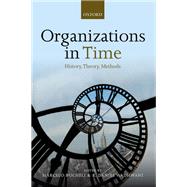Why does history matter to our understanding of management, organizations, and markets? What theoretical insights can it offer into organizational processes? How can scholars use historical sources and methods to address research questions in management and organization studies?
This book brings together leading organization scholars and business historians to examine the opportunities and challenges of incorporating historical research into the study of firms and markets. It examines the reasons for the growing interest in historically grounded research in management departments and business schools, and considers both the intellectual and practical questions the endeavour faces. The volume is divided into three parts. The first part, History and Organization Theory, considers the relationship between historical reasoning and key theoretical schools of organizational thought, including institutional theory, evolutionary theory, and critical theory. The second part, Actors and Markets, considers how historical perspective can provide researchers with insights into organizational change, entrepreneurial processes, industry emergence, and the co-evolution of states and markets. In the final section, Sources and Methods, the contributors explicate historical methodologies within the context of other approaches to studying organizations and provide concrete suggestions for researchers in the field. The introduction contextualizes these issues within the broader context of developments in the fields of business history and organization studies, and orients readers to the 'future of the past in management and organization studies.'








